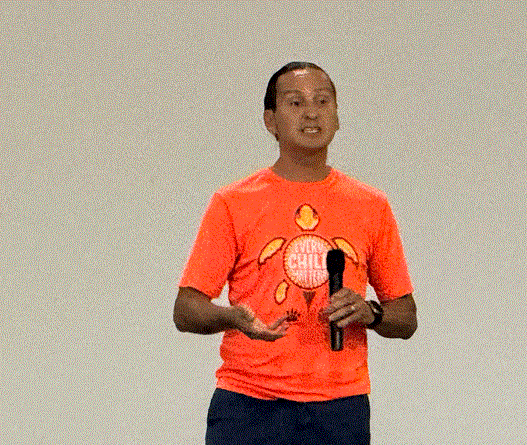ARCOLA - The Arcola Prairie Place Complex was a packed house Oct. 1, as the Town of Arcola, Arcola School and Pheasant Rump Nakota First Nation (PRNFN) held their National Day of Truth and Reconciliation event.
To begin the afternoon, a community lunch was held with bannock tacos, and all the proceeds were donated to PRNFN for the Little People Learning Lodge and youth programming.
The complex filled with 425 people to listen to Cadmus Delorme, a prominent Indigenous leader and advocate, who continues to be an influential voice in the ongoing conversation about Truth and Reconciliation in Canada.
As the former chief of the Cowessess First Nations, Delorme has been instrumental in fostering dialogue and understanding between Indigenous and non-Indigenous communities, emphasizing the need for historical truths to be acknowledged and for real steps toward healing to be taken.
One of Delorme’s core messages is the importance of education in reconciliation efforts. He spoke about how the history of Indigenous peoples, particularly the traumatic legacy of residential schools, has been under-taught or misrepresented in Canadian society.
He stresses that for reconciliation to be meaningful, Canadians must first understand the full extent of the harms caused by colonization, including the systemic racism that continues to affect Indigenous communities today.
In his speech, Delorme highlighted the role of personal responsibility in reconciliation. He believes that while governments and institutions have a critical role to play, individuals must also engage in self-education and reflection.
He encourages Canadians to listen to the stories of survivors and to support Indigenous-led initiatives aimed at restoring cultural pride, language and traditions.
Delorme spoke about the seven generations in his family, and how changes happened before, during and after the residential schools. Before residential schools, his ancestors new how to love, give a gentle touch and to teach children these values. During the residential school system, this generation only knew they were not valued or loved, and received no respect. Today they are learning once again how to love each other, and how to teach one and another the values in life, by picking up the pieces and having a normal life.
He went on to say that Canadians have inherited a history that is hard to understand, but it is a history that needs to be taught and is now being brought forward in schools.
“The greatest warrior brings peace; we do not want people to feel sorry for us, we just want to be treated as equals,” said Delorme.
"Sometimes we are needing an extra friend, so we can all understand each other,” he added.
Delorme spoke on values of humility, respect and empathy in his talk, as he wants a path that moves forward and is rooted in mutual understanding and collective action.
One of the key areas Delorme focuses on is economic reconciliation. He believes that true reconciliation involves ensuring that Indigenous communities have equitable access to resources and opportunity. This includes creating a pathway for Indigenous peoples to thrive in business, education and governance, without losing sight of their cultural identities.
Delorme’s vision for the future is one where Indigenous and non-Indigenous peoples walk together, united by a shared commitment to healing the wounds of the past and building a brighter future.
At the end of his speech, the drums began to play, and they sang the Nakota friendship song.
The Arcola School, Town of Arcola and PRNFN thanked everyone for coming out, and people could stick around to socialize and embrace the moment of Truth and Reconciliation.







